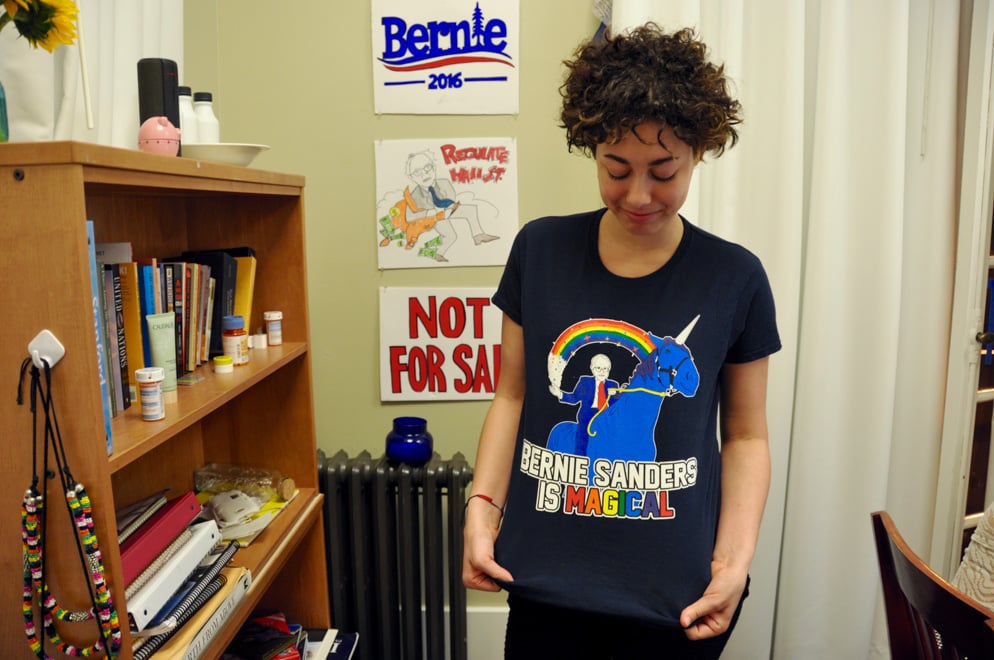As the opening of the 2016 primary season propels presidential politics into high gear, Stanford student groups supporting Democratic candidates Hillary Clinton and Bernie Sanders are leaving campus to campaign.
Two groups, Stanford Students for Bernie and Stanford Students for Hillary Clinton, will both travel to Nevada in advance of the state’s Feb. 20 Democratic caucus to rally support for their candidates.
The Nevada caucus, one of four “early” primaries and caucuses, is the first party contest in the western United States. For both former Secretary of State Clinton, who achieved a narrow victory in the Feb. 1 Iowa caucus, and Senator Sanders, who won the New Hampshire primary on Feb. 9, Nevada has become a crucial locus of campaign activity.
“Nevada is still kind of a battleground,” said co-founder of Stanford Students for Bernie Carla Genai Lewis ’18. “Figuring out where the advantage is and how to get the advantage is a really exciting process.”
11 members of Stanford Students for Bernie will travel to Reno this weekend, joining Sanders supporters and groups from other California colleges at the Nevada campaign office. They will spend the Presidents’ Day weekend promoting Sanders via door-to-door canvassing and “phone banking,” making calls to potential voters.
Stanford Students for Hillary Clinton will embark for Nevada the following weekend to join a “Get Out the Caucus” drive coordinated by the Clinton campaign.
The Feb. 19 trip will be the group’s second journey to Nevada; Stanford Students for Hillary Clinton co-leaders Amanda Brockbank ’16, Sara Orton ’16 and Stephen Paduano ’17 traveled to Reno last month with pro-Clinton campus groups from UC Davis and UC Berkeley. While there, they canvassed and connected with local field organizers for the Clinton campaign.
The upcoming trip will serve a different purpose, Brockbank said.
“In the weeks leading up to the election, our goal was to get people to commit to caucus for Hillary,” she said. “During the caucus itself, we want to make sure that people actually go [to their polling places].”
Brockbank, who supports Clinton for her foreign policy expertise and stances on issues like gun control and campus sexual assault prevention, said that student groups play a critical role in engaging “a new generation of voters.”
Paduano, who has interned for the Clinton campaign, added that the former senator and First Lady has been the subject of sexist attacks from both Democratic and Republican opposition. Clinton “keeps having to play defense” as she vies for the White House, Paduano said – and student outreach efforts are instrumental in positioning her to go on the offensive.
Lewis also believes student organizing will be pivotal.
Obama’s widely unanticipated defeat of Clinton for the 2008 Democratic nomination could not have happened without the efforts of grassroots organizers, she said, adding that Sanders’ quick rise to national recognition makes on-the-ground campaigning a top priority for his supporters in Nevada.
On campus, the Clinton group has used a variety of grassroots strategies, including a phone-banking event. The Sanders group has held a sign-making event, several phone-banking events and a voter registration drive.
However, the organizations have struggled to find campaign space at Stanford. Because Student Activities and Leadership (SAL) rules prohibit phone banking or tabling in Old Union or other common spaces, the on-campus Sanders campaign has been largely operated out of Lewis’ dorm room. The Clinton group also runs many of its activities and meetings in student housing.
Both groups stressed the benefits of coordinating with national campaign organizations on their on- and off-campus organizing work.
Connecting with regional organizers for the Sanders campaign put Stanford Students for Bernie “more in sync” with the campaign’s national direction, Lewis said.
“When we schedule [campaign efforts] the same way, we’re smarter about the way we do them,” she said.
Stanford Students for Hillary Clinton has also developed a relationship with Clinton’s campaign. The group uses email, social media and the messaging app Slack to discuss outreach plans with campaign officials.
Both organizations have also found valuable support in the field from campaign offices and networks of like-minded supporters.
On their January trip to Nevada, Stanford Students for Hillary Clinton organizers had the chance to talk tactics with campaign officials, connect with other campus organizations and even stop for a picture with actor Tony Goldwyn, who plays President Fitzgerald Grant in the political TV drama “Scandal.”
Lewis and other leaders of Stanford Students for Bernie found temporary housing and campaign partners in Nevada by posting in pro-Sanders Facebook pages. One Nevada couple, whom the group located on AirBnB, even offered to house Sanders campaigners for free.
At the Reno campaign headquarters, Stanford Students for Bernie members hope to learn campaigning strategies from field organizers — and potentially meet such high-profile Sanders supporters as Ben Cohen and Jerry Greenfield of Ben and Jerry’s Ice Cream.
Organizing campaign travel isn’t all celebrity photo ops and free lodging, however. Because neither organization is eligible to receive funding from Stanford or from the national Clinton and Sanders campaigns, group members must finance their out-of-state trips.
Echoing their candidate’s much-touted reliance on small individual contributions, Stanford Students for Bernie will pay for their travel to Nevada entirely with donated funds from Facebook fans and local supporters, as well as pooled funds with other local campus organizations. Stanford Students for Hillary plans to “read the field” to determine their financing strategy, although Orton stressed that the group “would love for cost not to be a limiting factor.”
Despite these logistical concerns, students are excited as the Nevada trips approach. Paduano said he is looking forward to discussing the election with other young voters.
“When you’re out on the ground, you’re filled with a whole lot of energy,” he said.
Contact Francesca Lupia at flupia ‘at’ stanford.edu.
